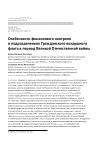Economic Security as a Factor of Ensuring Sovereign Scientific and Technological Development and Enhancing the National Competitiveness of the Russian Federation
DOI: 10.33917/es-4.196.2024.74-81
The article examines the issues of stimulating the Russian economy through mechanism for implementing megaprojects, assesses the implementation risks and provides recommendations for providing economic security of the Russian Federation in the context of the current GDP structure.
References:
1. Rasporyazhenie Pravitel’stva RF ot 20 maya 2023 g. N 1315-r “Ob utverzhdenii Kontseptsii tekhnologicheskogo razvitiya na period do 2030 goda” [Order of the Government of the Russian Federation of May 20, 2023 No. 1315-r “On Approval of the Concept of Technological Development for the Period up to 2030”]. Kodeks, available at: https://docs.cntd.ru/document/1301657597#6580IP
2. Plenarnoe zasedanie Evraziyskogo ekonomicheskogo foruma [Plenary Session of the Eurasian Economic Forum]. Ofitsial’noe internet-predstavitel’stvo prezidenta Rossii, 2023, 24 maya, available at: http://www.kremlin.ru/events/president/news/71198
3. Ukaz Prezidenta RF ot 28 fevralya 2024 g. N 145 “O Strategii nauchno-tekhnologicheskogo razvitiya Rossiyskoy Federatsii” [Decree of the President of the Russian Federation of February 28, 2024 No. 145 “On the Strategy for Scientific and Technological Development of the Russian Federation”]. Ofitsial’nyy internet-portal pravovoy informatsii, available at: http://publication.pravo.gov.ru/document/0001202402280003?index=2
4. Morunov V.V. Teoreticheskie podkhody k opredeleniyu sushchnosti ekonomicheskoy bezopasnosti [Theoretical Approaches to Defining the Essence of Economic Security]. VEPS. 2011. № 4. URL: https://cyberleninka.ru/article/n/teoreticheskie-podhody-k-opredeleniyu-suschnosti-ekonomicheskoy-bezopasnosti
5. Radygin A.D., Entov R.M., Abramov A.E., Chernova M.I., Mal’ginov G.N. Privatizatsiya 30 let spustya: masshtaby i effektivnost’ gosudarstvennogo sektora [Privatization 30 Years Later: The Scale and Efficiency of the Public Sector]. Moscow, ID “Delo” RANKhiGS. 2019. URL: https://ipei.ranepa.ru/ru/kgu
6. Likholetov V.V. Strategicheskie aspekty ekonomicheskoy bezopasnosti [Strategic Aspects of Economic Security]. Obrazovatel’naya platforma “Yurayt”, 2023, 201, available at: https://urait.ru/bcode/519502
7. Vlasti obsudili vvod garantirovannogo dokhoda dlya investorov v megaproekty. Gosudarstvo mozhet obespechit’ im khedzhirovanie riskov [Authorities Discussed the Introduction of a Guaranteed Income for Investors in Megaprojects. The State can Provide them with Risk Hedging]. RBK, 2023, 26 oktyabrya, available at: https://www.rbc.ru/economics/26/10/2023/653900cc9a7947b40010637f?from=copy
8. Bezbozhnova E.A. Ekonomicheskaya bezopasnost’ gosudarstva v kontekste tekhnologicheskogo razvitiya [Economic Security of the State in the Context of Technological Development]. Ekonomika i sovremennyy menedzhment: teoriya, metodologiya, praktika. Penza, Nauka i Prosveshchenie, 2022, pp. 139–141.
9. Karavaeva I.V. Natsional’naya ekonomicheskaya bezopasnost’ v teoreticheskikh issledovaniyakh Instituta ekonomiki RAN [National Economic Security in Theoretical Research of the Institute of Economics of the Russian Academy of Sciences]. Vestnik Instituta ekonomiki Rossiyskoy akademii nauk, 2020, no 2, available at: https://cyberleninka.ru/article/n/natsionalnaya-ekonomicheskaya-bezopasnost-v-teoreticheskih-issledovaniyah-instituta-ekonomiki-ran





